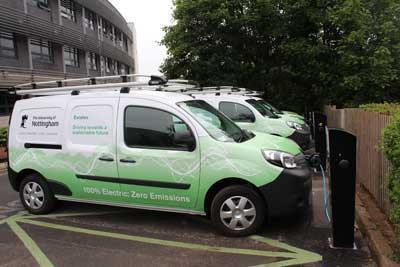
The University of Nottingham has added nine electric Renault Kangoo vans to its fleet as part of its sustainability strategy.
They will account for around 15% of the fleet vehicles used by the university’s estates and catering teams every day.
Nottingham said the new zero-CO2-emission vans will improve air quality, reduce noise pollution through their quiet running, and lower operating costs, as they cost around 3p per mile in electricity. Their ongoing operational performance would be monitored by university academics.
The Kangoos can travel up to 80 miles on one charge, and the university said early feedback from drivers had been very positive.
Colin Harley, maintenance operations manager, building services and driver of one of the new vehicles, said: “These electric vehicles are ideal for our needs at the university. They have power in abundance, are even easier to drive than a petrol or diesel automatic, and with the normal distances we drive around campus they only require charging once a week.”
To support the wider use of electric vehicles, the university has installed charging stations, where staff and visitors can charge their personal electric vehicles free of charge.
Andy Nolan, director of sustainability, said: “The electric vehicles offer significant improvements to local air quality and reduce noise levels too as well as having some carbon-reduction benefits. We are also making the charge points available to staff with electric cars for use during the day in the hope we will see more staff choose cleaner and more efficient cars to make their journey to work.”
The new Renault Kangoo electric vans are not the first sustainable vehicles to be used by the university – in 2013, the Faculty of Engineering invested in a hydrogen-fuelled van, with a refuelling station at Jubilee Campus, as both a green initiative and an opportunity to study the true cost of hydrogen fuel.













